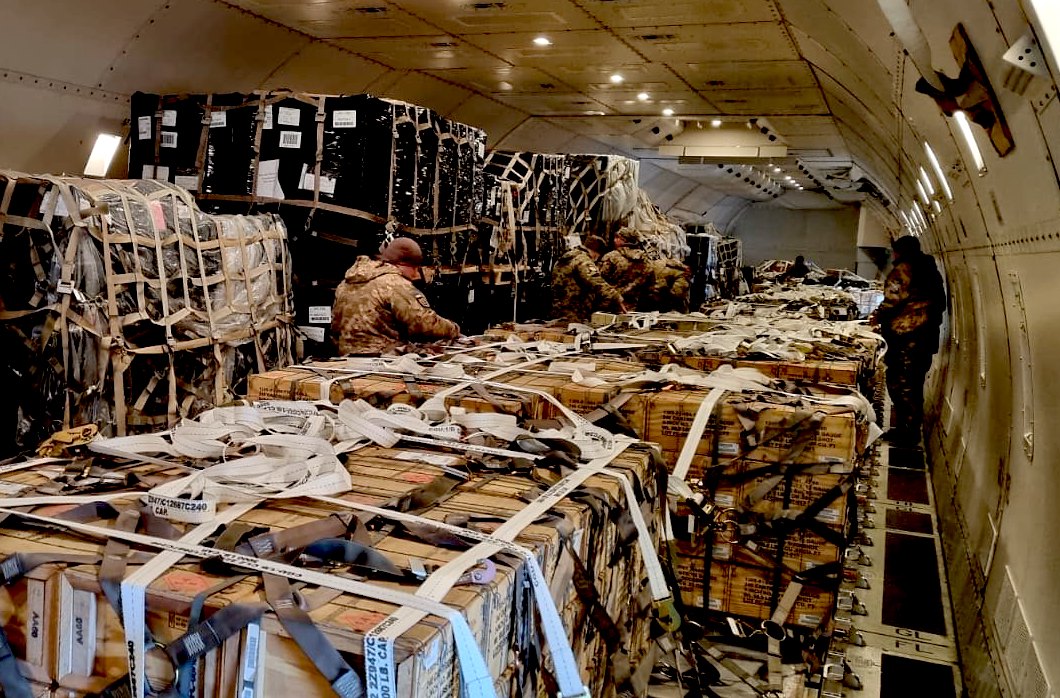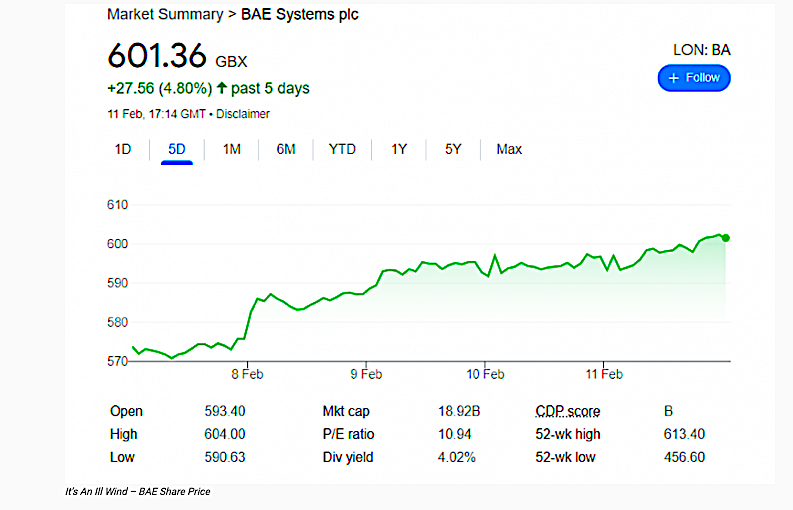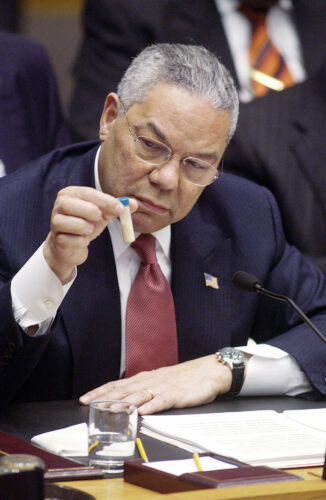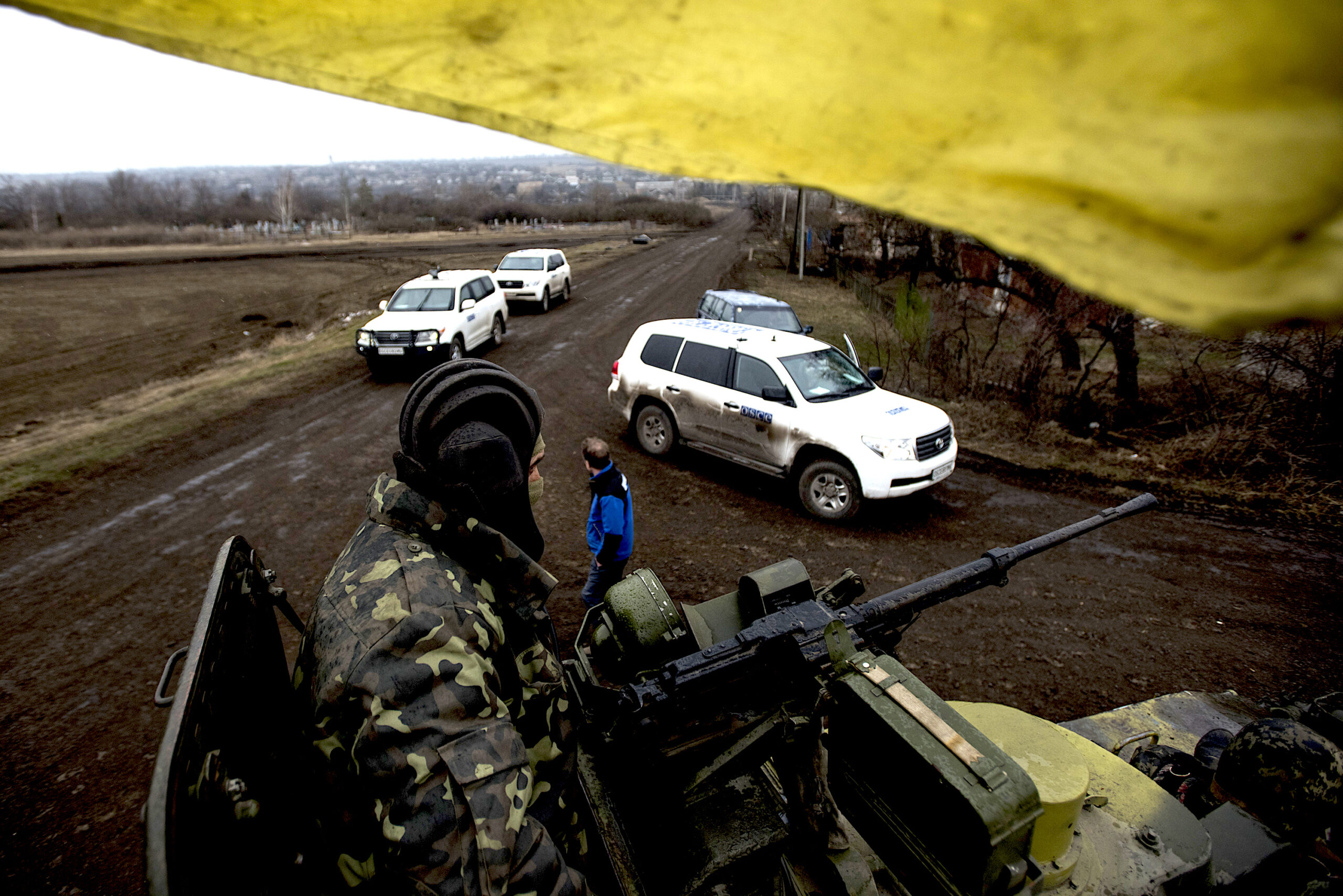Warmongering is always disgusting, writes Craig Murray. But especially so when it’s done by the same powers that have abandoned an entirely sensible framework for peace in Ukraine that they themselves initiated.

U.S. military aid delivery to Ukraine, Jan 28. (U.S. Embassy Kyiv Ukraine, Flickr )
By Craig Murray
CraigMurray.org.uk
 The mainstream media is, without exception, repeating the unevidenced claim from the Biden administration that Russia is about to invade Ukraine. They do this with no proper journalistic questioning or skepticism. They do this despite the fact that, in the last month, not only have we had repeated cries that invasion is “imminent,” we have had specific secret intelligence sourced claims from the Americans, that a Russian staged false flag attack was about to happen, and from the British, that there was about to be a coup in Kiev led by very minor figures. Both claims turned out to be nonsense.
The mainstream media is, without exception, repeating the unevidenced claim from the Biden administration that Russia is about to invade Ukraine. They do this with no proper journalistic questioning or skepticism. They do this despite the fact that, in the last month, not only have we had repeated cries that invasion is “imminent,” we have had specific secret intelligence sourced claims from the Americans, that a Russian staged false flag attack was about to happen, and from the British, that there was about to be a coup in Kiev led by very minor figures. Both claims turned out to be nonsense.
Perhaps more pertinently, the media do this as though the invasion of Iraq had never happened and they had never before been misled by U.S. and U.K. governments, citing intelligence sources.
A couple of nights ago I watched the press review of that day’s papers on both Sky and BBC News. They showed all of the front pages, all of which repeated, without qualification, the warning that Russia will invade in the next few days. The discussion, like the news output all day, took the accuracy of this as certain.
Wars are of course good for the media; wars bring news viewers and sell newspapers. They are also very good for the arms industry. Pity the poor arms manufacturers and arms dealers, who haven’t had a really full-throated NATO military action since Libya. Massacring women and children in Yemen and through drone strikes throughout Middle East and Asia is a nice little business, but nothing like as profitable as proper all-out war.
 A BBC reporter on Radio 4 recently stated that the U.S. was sending troops to the Baltic States and elsewhere in Eastern Europe “to deter Russian aggression.” What a stupid thing to say. The “aggressive” Russian forces are inside Russia. The American troops are 5,000 miles from home.
A BBC reporter on Radio 4 recently stated that the U.S. was sending troops to the Baltic States and elsewhere in Eastern Europe “to deter Russian aggression.” What a stupid thing to say. The “aggressive” Russian forces are inside Russia. The American troops are 5,000 miles from home.
One swallow doth not a summer make; I was hopeful that this reporter’s following example might lead others to engage their brains, but that was fanciful:
It is interesting that a number of people lost their jobs for not supporting the Iraq War, both in the media and civil service. Greg Dyke lost the leadership of the BBC, because the BBC had questioned the non-existence of the Iraqi weapons of mass destruction. David Kelly was murdered for giving them information.
But not one single person suffered any career detriment at all for supporting the Iraq War and for spreading the lying narrative of the Iraqi WMD. In the U.K., former Prime Minister Tony Blair, his Foreign Minister Jack Straw and press spokesman Alistair Campbell are treated as gurus by the media. The journalists who now shill for war with Russia are precisely the same journalists who shilled for war with Iraq. Why would they not push fake intelligence now, when pushing fake intelligence then boosted their careers, as they enabled so many of the powerful to get richer still from war?
Human Intelligence’

Colin Powell’s vial display at U.N. Security Council, Feb. 5, 2003.
(UN Photo/Mark Garten)
The U.K.’s “Dirty dossier” on Iraqi WMD consisted more or less entirely, where it used intelligence sources, of declassified human intelligence rather than signals intelligence. “Human intelligence” simply means something an informant told us, usually for large sums of cash. The “intelligence” on Iraqi WMD did exist — there was no shortage at all of Iraqi colonels willing to make up stories about WMD in return for briefcases full of dollars or krugerrands. What Blair and Straw did, with the practical help of fellow war criminals like Sir Richard Dearlove and Sir John Scarlett, was to ignore the filters that assess such “intelligence” for credibility, in favor of presenting the picture the government wished to show to the world to justify war.
Signals intelligence, by contrast, is communications intercept, and is generally more accurate (though of course there can be planted misleading communications).
I can tell you that the U.S. National Security Agency, or NSA, has shared with the U.K. Government Communications Headquarters, or GCHQ, no communications intelligence that indicates an imminent Russian attack.
As those two deeply integrated agencies share everything, this “imminent attack” knowledge is therefore human intelligence, like the Iraq dossier. Alternatively, it is simply a surmise from satellite and other monitoring of the movement of Russian assets.
U.S. President Joe Biden and U.K. Prime Minister Boris Johnson both have an interest in stoking the fires of conflict to try to improve (well deserved) terrible poll ratings at home. NATO has an interest in promoting Cold War, its traditional raison d’etre. The disastrous results of NATO’s attempts to expand its role in Afghanistan and Libya have led to the organization needing an apparent success.
Taunting Putin
All these Western political interests see a win-win over Ukraine, because when Russian President Vladimir Putin does not invade, they can claim it is a victory and that they forced Putin to back down.
There is a real problem here. By taunting Putin with the position that Johnson and Biden will claim Putin lost if he does not invade, they are effectively daring him to invade.
This is terrible diplomacy, unless the U.S. and U.K. actually want a war — and that takes us back again to the interests of the military and security services and the arms industry.
I maintain the view that Putin is far too wily to be pushed into an invasion. If Putin really wished to escalate matters, he would be much more likely to cut gas supplies than to invade Ukraine. There are two points to make on this.
“The journalists who now shill for war with Russia are precisely the same journalists who shilled for war with Iraq.”
Firstly, Ukraine is said to be less dependent now on Russian gas because, rather than buy direct from Russia, it buys from third countries. But it is still Russian gas, which is being sold on by another state merely on paper. The multi-invoicing may provide some diplomatic cover and some protection against price sanction, but not against the tap being turned off.
Secondly, it is argued that if Russia cut gas to Ukraine, Ukraine could cut off transit supplies to much of the rest of Europe, reducing Russian income. But that would almost certainly happen more seriously if Putin did indeed invade Ukraine, which would almost certainly trigger Ukrainian destruction of transit infrastructure.
There remains much else Putin can do before invading. NATO’s ultra-aggressive attitude to Russia, insisting on encircling it with missile systems ever creeping closer, is unlikely to be changed in the short term. But Russia has already achieved the exodus of many NATO “trainers” diplomats and nationals from Ukraine in the last few days.
While the West was looking the wrong way, Putin has also, with a tiny use of troops, greatly increased Russian influence in Kazakhstan, a massively resource rich country. That may well prove to be the most important diplomatic move of the year.
As for Ukraine itself, I annoyed some Putin fans when I posited that Russia’s annexation of Crimea was a pyrrhic victory for Putin. After 30 years of contention, it swung Kiev much more firmly into the Western diplomatic orbit and made the coup of 2014 irreversible, when it had been shaky.
The Minsk Agreements appear to be a very sensible way forward in Ukraine; in fact, the principles embodied in the Minsk agreements appear to be essential to a settlement. They are really very simple, covering Ukraine gaining control of its borders, devolution and a high degree of autonomy for the Russian speaking areas in the east, disarmament and the withdrawal of all foreign forces and mercenaries from Ukraine, release of prisoners and an amnesty.

OSCE monitoring the movement of heavy weaponry in eastern Ukraine, March 2015. (OSCE Special Monitoring Mission to Ukraine, CC BY 2.0, Wikimedia Commons)
The Western media ignores or dismisses the Minsk agreements. But these were negotiated by the Organization for Security and Cooperation in Europe, of which both the U.K. and the U.S. are members, together with Russia and Ukraine. They were lodged with the United Nations as a binding international agreement.
The First Minsk Agreement is very short:
“Upon consideration and discussion of the proposals put forward by the
participants of the consultations in Minsk on 1 September 2014, the Trilateral
Contact Group, consisting of representatives of Ukraine, the Russian Federation and the Organization for Security and Cooperation in Europe (OSCE), reached an
understanding with respect to the need to implement the following steps:
1. Ensure the immediate bilateral cessation of the use of weapons.
2. Ensure monitoring and verification by OSCE of the regime of non-use of
weapons.
3. Implement decentralization of power, including by enacting the Law of
Ukraine on the interim status of local self-government in certain areas of the
Donetsk and Luhansk regions (Law on Special Status).
4. Ensure permanent monitoring on the Ukrainian-Russian State border and
verification by OSCE, along with the establishment of a security area in the border regions of Ukraine and the Russian Federation.
5. Immediately release all hostages and unlawfully detained persons.
6. Enact a law prohibiting the prosecution and punishment of persons in
connection with the events that took place in certain areas of the Donetsk and
Luhansk regions of Ukraine.
7. Continue an inclusive national dialogue.
8. Adopt measures aimed at improving the humanitarian situation in
Donbass.
9. Ensure the holding of early local elections in accordance with the Law of
Ukraine on the interim status of local self-government in certain areas of the
Donetsk and Luhansk regions (Law on Special Status).
10. Remove unlawful military formations and military hardware, as well as
militants and mercenaries, from the territory of Ukraine.
11. Adopt a programme for the economic revival of Donbass and the
resumption of vital activity in the region.
12. Provide personal security guarantees for the participants of the
consultations.”
The second Minsk Agreement fleshes this out a little
“Package of measures for the Implementation of the Minsk agreements
1. Immediate and comprehensive ceasefire in certain areas of the Donetsk and Lugansk regions of Ukraine and its strict implementation starting from 00.00 AM (Kiev time) on the 15th of February, 2015.
2. Withdrawal of heavy weapons by both sides on equal distances in order to create a security
zone at least 50 km wide from each other for the artillery systems with caliber greater than
100mm and more, a security zone of 70 km wide for MLRS and 140 km wide for MLRS
‘Tornado-C’, ‘Uragan’, ‘Smerch’ and Tactical missile systems ‘Tochka’ (‘Tochka U’):
– for the Ukrainian troops: from the de facto line of contact;
– for the armed formations from certain areas of the Donetsk and Lugansk oblast of Ukraine
from the line of contact according to the Minsk memorandum of September 19, 2014.
The withdrawal of the heavy weapons as specified above is to start on day 2 of the ceasefire at
the latest and to be completed within 14 days.
The process shall be facilitated by the OSCE and supported by the Trilateral Contact Group.
3. Ensure effective monitoring and verification of the ceasefire regime and the withdrawal of
heavy weapons by the OSCE from the day 1 of the withdrawal, using all technical equipment
necessary, including satellites, drones, radar equipment, etc.
4. Launch a dialogue, on day 1 of the withdrawal on modalities of local elections in accordance
with Ukrainian legislation and the Law of Ukraine ‘On interim local self-government order in
certain areas of the Donetsk and Lugansk regions” as well as on the future regime of these
areas based on this Law.
Adopt promptly, by no later than 30 days after the date of signing of the document a
resolution of the Parliament of Ukraine specifying the area enjoying the special regime, under
the Law of Ukraine On interim local self-government order in certain areas of the Donetsk and
Lugansk regions,, based on the line of the Minsk Memorandum of September 19, 2014.
5. Ensure pardon and amnesty by enacting the law prohibiting the prosecution and punishment
of persons in connection with the events that took place in certain areas of the Donetsk and
Lugansk regions of Ukraine.
6. Ensure release and exchange of all hostages and unlawfully detained persons, based on the
principle ‘all for all’. This process is to be finished on the day 5 after the withdrawal at the
latest.
7. Ensure safe access, delivery, storage, and distribution of humanitarian assistance to those in
need, on the basis of an international mechanism.
8. Definition of modalities of full resumption of socio-economic ties, including social transfers,
such as pension, payments and other payments (incomes and revenues, timely payments of all
utility bills, reinstating taxation within the legal framework of Ukraine).
To this end, Ukraine shall reinstate control of the segment of its banking system in the conflict
affected areas and possibly an international mechanism to facilitate such transfers shall be
established.
9. Reinstatement of full control of the state border by the government of Ukraine throughout the
conflict area, starting on day 1 after the local elections and ending after the comprehensive
political settlement (local elections in certain areas of the Donetsk and Lugansk regions on the
basis of the Law of Ukraine and constitutional reform) to be finalized by the end of 2015,
provided that paragraph 11 has been implemented in consultation with and upon agreement
by representatives of certain areas of the Donetsk and Lugansk regions in the framework of
the Trilateral Contact Group.
10. Withdrawal of all foreign armed formations, military equipment, as well as mercenaries from
the territory of Ukraine under monitoring of the OSCE. Disarmament of all illegal groups.
11. Carrying out constitutional reform in Ukraine with a new Constitution entering into force by
the end of 2015, providing for decentralization as a key element (including a reference to the
specificities of certain areas in the Donetsk and Lugansk regions, agreed with the
representatives of these areas), as well as adopting permanent legislation on the special status
of certain areas of the Donetsk and Lugansk regions in line with measures as set out in the
footnote until the end of 2015
12. Based on the Law of Ukraine “On interim local self-government order in certain areas of the
Donetsk and Lugansk regions”, questions related to local elections will be discussed and
agreed upon with representatives of certain areas of the Donetsk and Lugansk regions in the
framework of the Trilateral Contact Group. Elections will be held in accordance with relevant
OSCE standards and monitored by OSCE/ODIHR.
13. Intensify the work of the Trilateral Contact Group including through the establishment of
working groups on the implementation of relevant aspects of the Minsk agreements. They will
reflect the composition of the Trilateral Contact Group.”
The Minsk Agreements were endorsed by the UN Security Council. The U.K. and U.S. are therefore obliged in law to support them. Yet they have abandoned them in favor of the highly intransigent position of the government of Ukraine in refusing to accept any devolution to administrations in Eastern Ukraine. Instead the Ukrainian government insists on a highly centralized Ukrainian nationalist state.
I choked on my tea a few days ago when a BBC correspondent reported that Ukraine could never implement the Minsk Agreements, because it could result in some pro-Putin MPs being elected to the Ukrainian parliament from the eastern areas. Remember that when they tell you they are starting a war for democracy.
Western warmongering is always disgusting, but still the more so when it involves abandonment of an entirely sensible framework for peace which they themselves initiated. The press and politicians all want a war. We have been here before, and we know that neither the people nor the truth can stop them.
Craig Murray is an author, broadcaster and human rights activist. He was British ambassador to Uzbekistan from August 2002 to October 2004 and rector of the University of Dundee from 2007 to 2010. His coverage is entirely dependent on reader support. Subscriptions to keep this blog going are gratefully received.
This article is from CraigMurray.org.uk.
The views expressed are solely those of the author and may or may not reflect those of Consortium News.

How can “the Russian leader’s unspoken threat to invade” be taken as an intent of anything, when nothing of the sort has actually been uttered by said person?
How can it be written by a pseudo-journalist in MSM, and seen as a threat, or anything at all, for that matter, other than the paranoid reflections of her/his editorial board proscribed concoctions of imagination that it is.
Photojournalism without a deliberate caption, is the art of using raw images, in an unspoken attempt to openly convey commentary to a viewer; to interpret for themselves what the picture paints.
Doing this is one thing! On the other hand, captioning the picture with a biased viewpoint is quite another matter – manipulative, underhanded propaganda.
Where human beings’ emotions and passions are engaged, and they always are, all is subjective; no opinion can be pure objectivity, despite what they try to inculcate nowadays into the minds of young students in the liberal “sciences” of academe.
Where the premeditated intent of journalism is to play off the subjective biases of human beings, there is no room for critical thinking, and no critical thinking is permitted in totalitarian societies; and isn’t this where we are at, especially in the U.S. today.
When the U.S. and its European allies (NATO) stage war games in the vicinity of Russia’s borders this should not be taken as a display of aggressive intent? However, when Americas purported archrivals respond in-kind, this threatens world peace? This is an open display of U.S. hegemonic sanctimony.
The Soviet Union may no longer exist, and Russia may have shrunk to half its size geographically, as well as in the economic sphere, but it is still the second most powerful nuclear power on the planet, lest anyone in American ‘diplomacy’ forget.
Where ethics and morality are corrupted beyond repair, only hypocrisy remains, and such, sad to say is where U.S. repute stands globally today. It is literally not worth the paper it is written on, nor is the rhetoric of the persons who represent it abroad, or anywhere else for that matter.
What do we still love about America? All that remains is the mythical idea of the biblical Jesus’ city upon a hill; daily cursed by the likes of bigoted, conceited, greedy and self-aggrandizing hypocrites. And those of us who remember, do recall their names; for what it is worth!
These are our leaders, asking for compromises from Russia et.al., yet compromise is NOT compromise, if it is unilateral coerced!
When has America ever shown a willingness to altruistically listen to two sides in a dispute, and devised a compromise acceptable to both; on behalf of humanity’s ability to survive equitably, rather than surreptitiously plotting its own narrow hegemonic self-interests in the bargain?
So long as a unilateral, hegemonic power reigns supreme over the nations of the world, there can be NO comity among the community of nations; as the disregard for United Nations Organizations decisions, by the hegemon, has shown since its founding in 1945; neither is an International Court of Justice viable, as an international court, so long as the global political and economic status quo goes unchallenged.
nice
Thanks for publishing the actual Minsk accords. It is refreshing to see journalists pointing to the actual documents, allowing the reader to see for themselves, instead of making vague references and asking the reader to trust the journalist’s interpretation.
Your Shakespeare quote is a good intro to your article, however I like it better when its was used in a former “Star Trek” movie. BTW, you never said whether Russian will invade or not, I suspect not, they already have what they want.
Mr. Murry great stuff. FYI
Last Friday Feb 11 2022 RT TV 9:29 – 10:00 CDST , I viewed Worlds Apart, hosted by Oksana Boyko who interviewed Nelson Wong. T0wards the end MR. Wong stated “All of Europe needs to discuss security”, which was a perfect fit for the end of the interview.
The former was, ” Must See TV ” , I would say the same for what follws here.
Up next was Chris Hedges talking t0 Richard Wolf.
Wolf stated that the Chinese and Russians have been working on an alternative to substitute for SWIFT. Something if successful could ruin the U.S. dollar sending the U.S. into out of control spiraling inflation.
He continues with a detailed explanation of cause and effects. This was not difficult to grasp.
Wolfs explanation doesn’t paint a pretty picture but it is just exactly what the US public needs to wake up to.
Putin need not invade Ukraine but only wait. According to Mr. Wong the changes have already taken place in the pecking order of who is number one in the coming future of the world economy.
Putin looks to still be winning, even after the “Village Idiot” from NYC has gone.
Thanks CN
The Minsk Agreements were endorsed by the UNSC and US/UK are obliged by law to support them, but do not.
Why hasn’t the UN taken action by itself since, such as establishing a DMZ in E Ukraine, perhaps on both boundaries?
Can other UNSC members vote or take action based upon the agreements?
You ask why the UN hasn’t taken action? The UN takes its orders from the US.